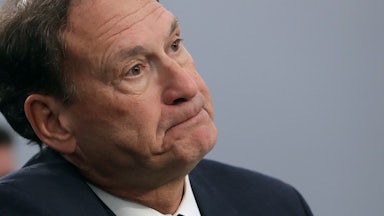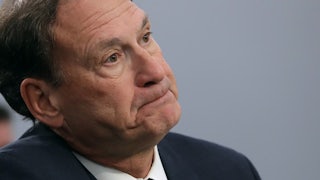An attack ad started airing recently in Nevada. It was a 30-second spot from incumbent Democratic Senator Catherine Cortez Masto’s campaign hitting her Republican opponent, Adam Laxalt, on pushing the Big Lie that the 2020 presidential election was stolen. The ad starts out with clips of rioters storming the Capitol, before pivoting to Laxalt, as a narrator says, “Adam Laxalt, the proud face of the Big Lie in Nevada, repeatedly pushing conspiracy theories without evidence.”
“Now Laxalt says he’ll try to overturn this year’s election if he doesn’t like the results,” the narrator says as the ad concludes.
To be clear, Laxalt wasn’t at the Capitol on January 6, 2021, and nowhere in the ad does it say as much. But it does a good job of tying the opponent to January 6. There are a handful of races around the country where attacks like that would ring even truer because the GOP candidate actually was there storming the Capitol that day. The Republican nominee for governor in Pennsylvania, for instance, Doug Mastriano, was part of the mob that stormed the Capitol. Likewise for J.R. Majewski, the Republican challenging Ohio Representative Marcy Kaptur, who was also at the Capitol. Another Capitol rioter, Derrick Van Orden, is running for Congress in Wisconsin’s 3rd congressional district—and is favored to win. Jason Riddle, who also was part of the January 6 mob, ran for Congress in New Hampshire—until he was sentenced to prison for his role in the insurrection.
These candidates have fielded and continue to field attacks from Democratic candidates and their allies on what they did on January 6. The ad from Cortez Masto, who recent polls show is basically in a dead heat with her Republican opponent, is a particularly hard-hitting bet that this issue will move swing-voting Nevadans. And Kaptur, the 19-term incumbent from the Cleveland area, has hit Majewski hard on January 6.
“I do think there’s a big difference between Republicans who are election deniers, which is a broader category,” said Democratic pollster Zac McCrary, who has been advising Kaptur. “But if you actually attended January 6 … if you were actually part of the riots—Majewski, for example, breached police barricades—that’s a different animal.”
McCrary said before recent revelations about Majewski faking his military record, which caused the national GOP to pull its support from his campaign, Kaptur’s campaign ran ads highlighting the Republican’s participation in the January 6 Capitol riot. One Kaptur ad from earlier this month tied Majewski to the QAnon conspiracists who stormed the Captiol. McCrary said his team’s polling data saw the attacks highlighting Majewski’s involvement in the mob violence resonated with voters. “Certainly in the Majewski example we did see that,” McCrary said. “We’ve seen that move numbers in polling. We’ve seen that move numbers in focus groups.”
Democratic pollster Molly Murphy added: “I’ll say that Jan 6–related messages against Republicans who were either directly involved (Mastriano, for example) or just supportive/defended the attackers [have] done very well, including among Independents.”
But as a party, Democrats haven’t made hammering Republicans on January 6 their primary focus of the 2022 election cycle. The political calculus of campaigning on January 6 has been complex. Not every Republican congressional and Senate candidate was there or participated in the insurrection. And then there are the candidates who share the same sentiment as the rioters—the false claim that the 2020 election was stolen. They may not have been at the Capitol, but they actively want voters to know they are of that tribe. And even as the January 6 committee reveals explosive information about what happened that day and how Donald Trump played a central role, it’s not clear how much those revelations have changed the dynamic of the 2022 midterms.
Other messages have been more effective across multiple kinds of races. Since the Supreme Court’s Dobbs decision, Democrats have seen a surge of support among key voting blocs on abortion rights. A NextGen America poll in late August found that a plurality of registered voters (44 percent) between 18 and 35 years old said they were motivated to vote in the 2022 midterms, a gain of six percentage points. That surge has elevated Democrats into a basic dead heat with Republicans. A recent NBC poll found 46 percent of those surveyed wanted Democrats to retain control of Congress after the midterms, and the same percentage wanted Republicans to be given control. On topics like health care, education, and “protecting democracy,” voters prefer Democrats, that poll found. On topics like crime or the border, voters prefer Republicans. Most polling shows the economy or health care as the top issue voters care about.
“There’s dynamics for every congressional race and every Senate race that are not exactly the same,” Democratic pollster Cornell Belcher said. In campaigns, Belcher explained, operatives—and pollsters in particular—line up a candidate’s positives and negatives and see which “resonate the strongest with the overall electorate” and “portions of the electorate that we need to move either off our opponent or mobilize for ourselves.”
Belcher said that he was “not surprised that universally the January 6 hit may not in fact be the strongest hit against some of these candidates, because some of these candidates are kind of batshit crazy.”
Belcher pointed to Mastriano as an example of the crazy and offered issues from abortion to “the Senate Republican tax plan, which Mitch McConnell keeps running from, to threats to democracy” as areas where Democrats are scoring points. “It’s a target-rich environment,” Belcher said.
I recently interviewed Congressman Ron Kind on how his district has changed over the years. His is one of those districts that only a certain kind of Democrat could hope to keep. The district runs from Lafayette in the southern part of Wisconsin to Eau Claire farther north and includes both rural and urban areas, as well as college campuses. Kind has represented it since 1996. In that time, it’s swung from voting Democratic (it went for the Democratic nominee in the presidential elections from 2000 to 2012) to being more Trumpy. In the last two elections, most voters in Wisconsin’s 3rd district voted for Donald Trump. Kind is retiring, and the Democratic nominee to replace him, Brad Pfaff, is the underdog in the election. Even if it’s a good election night in November for Democrats, Van Orden could still succeed Kind. If Pfaff wins in November, that means Democrats have had a great night.
“He was out on the wall of the Capitol. He had an earpiece … directing other insurrectionists where they needed to go. Trust me, there are a lot of pragmatic Republicans who feel very uneasy about his involvement,” Kind said. “That’s one reason why his negatives are so high.… So I think this is a much closer race than most people realize.”
The Wisconsin 3rd congressional district race is hard for Democrats. It isn’t quite as difficult in Nevada for Cortez Masto to beat Laxalt—but it isn’t a cakewalk either. On Friday, Politico reported that Nevada and Georgia are now the two most precarious of the “core four” battleground states with incumbent Democrats running for reelection (New Hampshire and Arizona are the others).
Control of the Senate could come down to whether Cortez Masto wins. For her to do that, she needs to win over many of the outstanding independent voters in Nevada right now. So it makes sense that she would run an ad connecting Laxalt to the Big Lie. There’s some evidence that such attacks resonate with independent voters. Democratic control of the Senate may depend on it.






